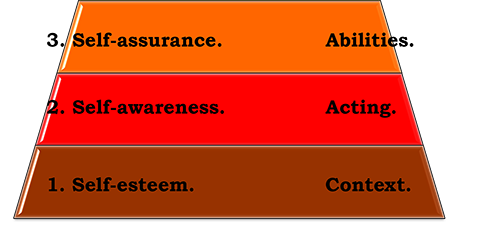 Self-assurance Self-assurance
To be self-assured is to know that one has the abilities and the knowledge one needs in a given situation, and to know that one will have access to these when needed. One is assured about oneself - one trusts oneself.
A positive self-esteem and good self-awareness also support self-assurance, so working with these levels will strengthen this one as well.
You might need to work with your self-assurance if
- You often feel uncertain of yourself and
you have poor self-assurance.
- You never believe that you have prepared enough for a task.
- You often ask others for advice,
even when you in reality know the answer.
- Most of the time, you think others’ abilities are superior to yours.
 Certain basic skills sometimes need to be improved Certain basic skills sometimes need to be improved
One may have deficiencies in certain basic skills, which may lead to poor self-assurance despite good knowledge and skills in a certain area of expertise.
Much in
PsykosyntesForums and Life Leadership Coachings services and products contain sections that train different basic skills, a training that increases the level of self-assurance (in alphabetical order):
- AOM Breathing: Learn a breathing technique for rapid relaxation.
- Basic Communication: Improve your ability for dialogue for ensuring good cooperation.
- Coaching, specifically on the level Learning. With the help of coaching you can assess which skills you should improve, and you will get clear and constructive feed-back in your training.
- Dyslexia: Reading and writing deficiencies have often a negative impact on self-assurance. Learn a method for training your brain for improving your visual spelling recall.
- Efficiency: Perform more with less energy, by learning how to use your time in a more efficient way - the e-course Eliminate Time Thieves, ETT.
- Get Unstuck: Learn to quickly stop an emotional block, in order to be able to act in a calm and constructive way.
- Handle Criticism: Learning to handle criticism in a calm and constructive way often strengthens self-assurance immensely.
- Stuttering: Learning to handle speech blocks strengthens the self-assurance in stutterers, which despite being very competent in other areas sometimes fail to show this.
- Overweight: To have been on a diet many times and to have failed each time wears on the self-assurance. Learn how to reach and how to keep your ideal weight without effort!
- Perception Channels: Much in the areas of education and information is based on visual skills. Persons primarily using their hearing to access information, or persons that need to test things in concrete ways, can feel unsure about themselves, even "untalented", when they fail to learn or take in information in the way others do. Assess your primary Perception Channel and make demands on how to get information in a way that corresponds to how your brain works!
|







